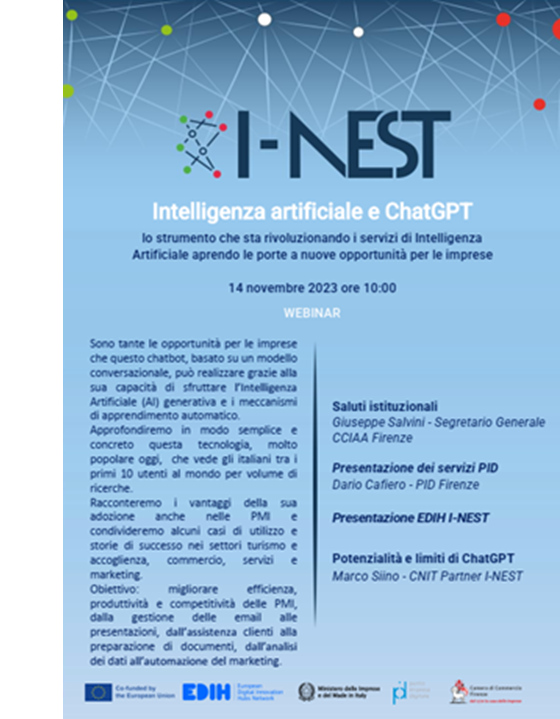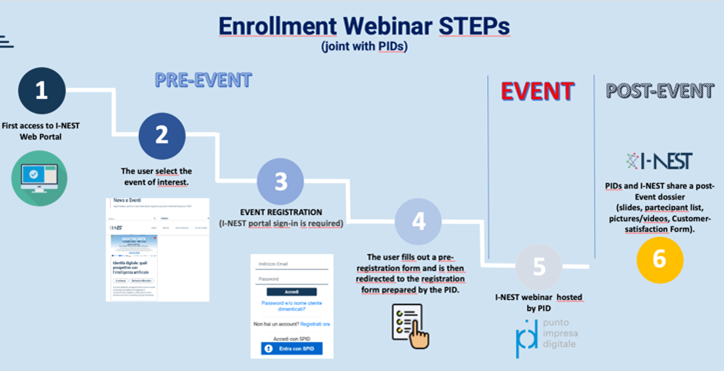General details
EDIHs involved
Challenges
The design and planning of an innovation path where the implementation and use of advanced digital technologies within SMEs is considered is sometimes difficult, specially in some business sectors such as construction, food and clothing industry, extremely important in the Italian landscape.
SMEs often struggle to see how advanced digital technologies align with their long-term goals and to identify specific areas where innovation could add value, improve efficiency, or generate new revenue streams.
The I-NEST Digital Hub operates at national level, targeting SMEs located in all Italian regions. The state of digital adoption of SMEs can be very different, but in most cases it is quite limited. Most SMEs find it difficult to keep up with the latest digital technology developments because they lack dedicated resources for scouting and testing innovative solutions. For instance, generative AI can enhance many routine processes in SMEs, yet adopting such technology is challenging. Anyway it is difficult for SMEs to start using these technologies which are not yet completely mature and usually need customisation and testing before adoption in an operational process.
Understanding the potential of technologies and looking at pilot projects and success cases can be inspiring for deciding to start an innovation path. However, reaching targeted companies experiencing similar problems in different geographic areas of the country and increasing awareness on partnership and collaboration opportunities is not immediate for a new established Digital Innovation Hub like I-NEST.
Solutions
 This challenge was effectively tackled by leveraging the national network of Points for Enterprise Digitalisation (PIDs) within the Italian Chambers of Commerce, comprising 88 strategic locations. A series of events were organised with the aim of showcasing the potential of various I-NEST hub technologies—primarily generative AI, cybersecurity, and the Internet of Things—through case studies and innovation pathways tailored to entrepreneurs.
This challenge was effectively tackled by leveraging the national network of Points for Enterprise Digitalisation (PIDs) within the Italian Chambers of Commerce, comprising 88 strategic locations. A series of events were organised with the aim of showcasing the potential of various I-NEST hub technologies—primarily generative AI, cybersecurity, and the Internet of Things—through case studies and innovation pathways tailored to entrepreneurs.
Each event began with a high-level introduction to the featured technology, followed by practical applications relevant to the participating companies' sectors. Testimonials and a Q&A session provided further insights, and in some instances, a dedicated segment on funding opportunities was included.
The key value for participants lies in direct interaction with hub experts, enabling them to uncover unmet needs, explore innovation opportunities, and learn about the services offered by the hub. To plan the event series, an initial presentation of the hub's technology catalog and case studies was conducted for the entire PID network. Subsequent online events were then tailored to the specific requests and needs of each PID ecosystem, considering the sectors of the companies involved.
As a follow-up of each event, feedback from the companies participating to the events was gathered. This information serves to better understand their needs and plan the next steps of the customer journey offered by I-NEST.

Results and Benefits
To date, these events have attracted 566 companies, with a final participation rate of 71% of the registered companies. Notably, around 19% of participants provided feedback through our post-event customer satisfaction survey.
The events have been very successful for both the EDIH and the participating companies. For I-NEST, the events provided a valuable opportunity to engage with a broad range of companies across Italy, allowing these businesses to learn about the hub’s activities and explore further opportunities for digital transformation. Moreover, taking into account the wide set of sectors of the involved companies, requests for technology applications in several domains were collected. Indeed, the participating companies spanned a variety of sectors, among which manufacturing, tourism, public sector, retail and IT.
From the companies’ perspective, the events significantly enhanced their awareness of the innovation opportunities enabled by I-NEST technologies. An analysis of participant profiles revealed that approximately 50% were entrepreneurs, while around 25% were technicians. This demonstrates the importance of engaging directly with decision-makers responsible for investment strategies.
Overall, the event format received high praise, with 69% of participants finding the events inspiring, despite the fact that 79% of the participants have basic knowledge of the topics presented. Feedback highlighted a strong interest in hub technologies such as Big Data and Analytics, AI, and Cybersecurity, with particular enthusiasm for the presentation of case studies.
These events were not only promotional activities for the hub but also served as valuable networking and orientation services. These events were not only promotional activities for the hub but also served as valuable networking and orientation services. The costs were fully covered by hub resources, although the PID network provided significant support in selecting topics, engaging companies, and inviting testimonials. While this support has not been quantified, it represents a form of external co-funding that was crucial to the successful organisation of the initiatives.
Perceived social/economic impact
I-NEST strives to be an inclusive hub, serving companies across Italy and spanning multiple sectors. This inclusiveness is achieved through our hierarchical network of contacts—from the Points for Enterprise Digitalisation (PIDs) to companies, and from the hub to the PIDs. Additionally, the informational events are tailored to address diverse vertical domains, company sizes, and varying capacities for innovation and investment.
The most important social and economic impacts of this initiative are:
-
To increase the digital awareness of a relatively large number of SMEs.
-
To trigger further cooperation between the SMEs and I-NEST Digital Innovation Hub. This further cooperation will generate the opportunity to offer services to the involved SMEs, in particular:
-
training services;
-
test before invest services;
-
services related to the access to funding opportunities.
-
Through the events, companies had the opportunity to be informed about emerging digital technologies and to be oriented towards the hub services at no cost. By grouping companies with similar needs for preliminary discussions with hub experts, I-NEST has been able to demonstrate its services without requiring co-funding from the participants. This strategic aggregation allowed I-NEST to reach a broader audience and significantly increase awareness of both the technologies and the hub’s offerings.
Looking ahead, I-NEST is now considering how to further exploit such aggregation opportunities for working on the verticalisation of some of the hub demonstrators.
To measure the success of this initiative, we are first counting the number of SMEs that have participated in the information events. Then the SMEs that have received other services from the I-NEST Digital Hub will also be considered, enabling the correlation of this information with the participation to the information events.
Measurable data
These events have attracted 566 companies for subscription, with a final participation rate of 71%, this is 402 SMEs.
19% of the attendees provided feedback through the questionnaire and the overall satisfaction rate measured by questionnaires is of 69%
Lessons learned
DO’s:
It was important to have the mediation of the Italian Chambers (through the PID) which companies already trust, for maximising the participation to the events. Therefore, I-NEST presented two levels of promotion initiatives:
-
The presentation of the hub topics and potential structuring of the events to the PID digital promoters (i.e. the presentation of the catalogues of events).
-
The presentation of one specific hub technology and related case studies with a verticalisation /customisation planned together with the PIDs (i.e. the events for potential hub customers).
Moreover, involving innovative companies as testimonials has been demonstrated an effective engagement solution, because companies take seriously the experience already matured by other companies.
DON’ts:
Informative events are mainly targeted to entrepreneurs, which need to decide or not on innovation investments; we understood that too technical presentations are not effective and that case studies need to be concrete as much as possible. Therefore the most important lesson is not to present too deep technical details in these information events.
Moreover, it is important to improve the engagement of the companies participating to the events for following them in the subsequent journey across the hub services for increasing digital maturity. So far, we generically presented the hub services, but we have left to the companies the post-event relationships with the hub. It could be important to take further initiatives also from the hub side. We believe this is an important area of improvement for our next information events. We plan to organise a process that includes sending of further messages and trying to contact personally the participants for a follow up of the event (of course asking the explicit permission of participants for this follow up contacts).
Need support?
Consult our catalogue to locate the Eupopean Digital Innovation Hub nearest to you and accelerate your company's digital transformation.

